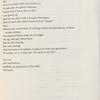4: Poem, a second translation of Yehuda Amichai’s “Wildpeace,” 1971.
Amichai is one of the most widely translated Hebrew poets of the twentieth century. English translations of his work began to appear in the early 1960s, and his friendship with English-language poets like Ted Hughes, Dennis Silk, and Harold Schimmel, all of whom promoted Amichai’s work in translation, facilitated the global circulation of his poetry. Languages are not static, so reading English translations of Amichai gives us a glimpse into how the English language has changed over the past fifty years (and more). We also observe how ideas about literary translation have developed and how translators over the years have been drawn to different areas of Amichai’s oeuvre—and sometimes to the same poems—thereby giving us a wide range of translated and retranslated material to enjoy and study.
Suggested Activities: Have students compare the translation of "Wildpeace" from resource 1 to the translation of the poem provided here, in resource 4. In this exercise, the emphasis should be on the value of retranslation and multiple translations. What new perspective on the poem does each translation offer, and how do the translators signal—in their word choices, line breaks, differences, and similarities—their distinct understandings of the poem? Go through each translation highlighting all of the differences and similarities. Use different colors to highlight nouns, verbs, and adjectives. How does the difference between “wildpeace” and “wild peace” predispose us to read the poem a certain way? Look up information about the translators—can we glean any meaningful insights from this biographical information (for example, Chana Bloch was an English-language poet)? Consider how context shapes translation—the time and place in which translations happen. If students are able to read the original Hebrew, ask them to compare the translations with the original but to focus on what is gained rather than lost in translation.
Source: Yehuda Amichai, “Wild Peace,” in Yehuda Amichai: A Life of Poetry 1948–1994, trans. by Benjamin and Barbara Harshav (New York: HarperCollins, 1994), 203.
Wild Peace
 Download image (482.66 KB)
Download image (482.66 KB)

